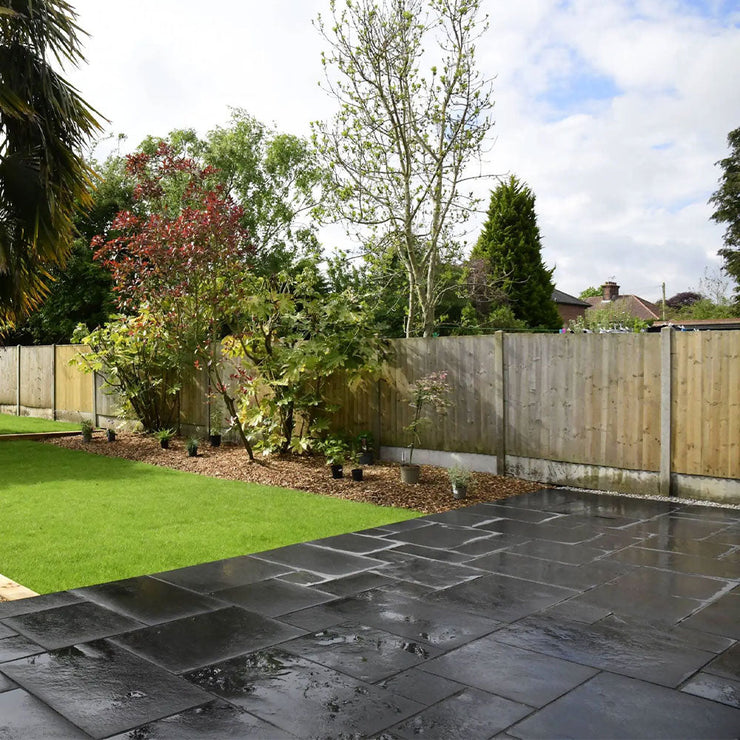
Is porcelain paving slippery?
So, you’re planning an outdoor project, and at the top of your materials list is a non-slip tile. You’ve searched for concrete paving slabs, Indian sandstone slabs and, finally, landed on porcelain paving. Now, your only question is: is porcelain paving slippery?
Porcelain paving is one of the best materials for long-term use. It’s durable, dynamic and, most importantly, designed specifically for slip resistance. You could be completing the area around your pool or creating a new, safer driveway.
It might be a domestic or commercial undertaking, but one thing your project must include is a non-slip surface. So, to learn more about why porcelain is a great fit, stay with Ovation Landscaping, your local paving slab supplier.
What are the benefits of porcelain paving?
Porcelain paving isn’t just lovely to look at, it’s also made of stronger stuff! Each tile is a mix of natural materials, including feldspar, kaolin (also known as white, soft clay), quartz, and fine clays.
These components are mixed with water to form a slurry, which is then processed in a ball mill. You end up with a fine, uniform consistency that’s perfect for the firing process, where the materials fuse evenly to create a dense structure.
Each pressed tile is compacted under high pressure and then fired in a kiln at temperatures reaching up to 1240°C! But what gives porcelain tiles glass-like, non-porous structure? Vitrification!
The end result is a tile with extremely low water absorption (around 0.05%) and resistance to staining.

Low-maintenance
The vitrification process also makes porcelain paving tiles extremely low maintenance.
Their smooth, non-porous surface resists dirt and grim, meaning a quick sweep and layer of warm, soapy water is enough to return your tiles to their original condition.
Durable
Again, thanks to vitrification, the dense composition of porcelain tiles makes them resistant to scratches, stains, and fading. They’ll maintain their appearance over time, even in high-traffic areas like gardens.
Aesthetic
Of course, you want your outdoor project to look good, too.
Manufacturers today offer a broad spectrum of colours and patterns. At Ovation Landscaping, we’ve got colour tones like blacks, greys and naturals which can mimic the appearance of natural stone, wood grain, or even concrete.
Is porcelain paving slippery?
No, porcelain paving that has undergone r-rating tests are not slippery. But what is an ‘r-rating’?
What are r-ratings?
R-ratings are used to indicate the slip resistance of flooring materials, including vinyl flooring and porcelain tiles. The ratings of a particular material are determined through a standardised testing method known as the ‘ramp test’.
Usually, a person walks on an inclined surface that has been coated with a contaminant (e.g., water or oil) to simulate slippery conditions. Then, the angle at which the person slips is recorded, and the material is assigned an R-rating!
Here are some examples:
|
R-rating |
What is it suitable for? |
|
R-9 |
A low level of slip resistance: materials with an R9 rating are suitable for indoor areas that are kept dry, such as living rooms or bedrooms |
|
R-10 |
A moderate level of slip resistance. They are suitable for areas that may occasionally become wet, such as kitchens or bathrooms |
|
R-11 |
A higher level of slip resistance. These materials are appropriate for areas that are frequently wet or have higher slip risks, such as outdoor patios or pool surrounds. |
|
R-12 |
A very high level of slip resistance. Materials with an R12 rating are suitable for commercial settings or areas with constant exposure to water, such as commercial kitchens or industrial environments. |
What factors affect slip-resistance?
The performance of porcelain paving slabs can be affected over time. Whether by a lack of cleaning, contaminants or general wear and tear, it’s important to understand the impact of long-term exposure to certain conditions.
Wear and tear
Do friends and family flock to your garden when the sun is out? Lucky you! But we must point out that over time (we’re talking 20–30 years), heavy foot traffic may slightly reduce your paving’s slip resistance.
General wear may lead to a reduction in the micro-texture that contributes to slip resistance, but with regular inspection, you can identify areas where the surface has become smoother and apply targeted intervention.
Contamination
If your porcelain paving is laid in an area that’s shaded or damp, contamination from leaves, dirt, algae or moss can create a slippery surface.
Reduced traction can be prevented with maintenance, like trimming overhanging branches or bushes and keeping on top of drainage.
Cleaning schedule
Are you someone who just forgets about garden maintenance? While it’s okay here and there, too much time between washes can lead to a slippery situation. We recommend periodic washing with appropriate cleaning agents.
Shop for porcelain paving slabs with Ovation Landscaping!
So, is porcelain paving slippery? Not if you look after it well and clean regularly: it’s really that easy. Look after your tiling, and you can enjoy 20–30 years of high-quality surfacing! If you’re convinced and looking for tiles of your own, work with Ovation Landscaping.
We’ve got great deals on natural stone tiles, and we also offer decorative aggregates, sleepers and posts, plus joining and grout!